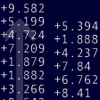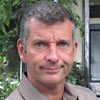Marie Colvin and Uzi Mahnaimi
Sky High
Win a Sky+ HD package including a Sony 32" LCD TV
Navigation - link to other main sections from here
From The Sunday Times
November 2, 2008
Questions raised over Syrian complicity in US raid
Syria has denounced a US strike on its territory but sources say Damascus secretly backed the raid
Video: Syrian minister criticises US raid
The 38-year-old farmer was watering his maize in the scrubby vastness of eastern Syria when four Black Hawk helicopters swooped in low over the palm trees, heading from the border with Iraq formed by the Euphrates River.
It was late afternoon. The light was fading and the chill of the desert winter night was setting in. The helicopters, following their leader in a disciplined arc, hovered just above the one-storey concrete and mud homes of the village of Sukariyeh before the attack began.
Two of them landed next to a ramshackle building site and uniformed men hit the ground firing. Two other helicopters gave aerial cover.
Related Links
“To begin with I thought they were Syrian helicopters, but then I saw eight or nine soldiers armed to the teeth. They carried big black M16s,” said Mohammad al-Ali, the farmer. His land lies closest to the site where an American commando squad last week staged an unprecedented strike in Syrian territory.
The guns were the clue to their identity – only Americans or their allies carry M16s; the Syrian army has Russian-made AK47s.
Ali said the troops raced to a compound of new homes, where men of the al-Hamad family were working. “Even before they ran from their helicopters they began to shoot at the workers,” Ali said. “The whole operation took 10 to 15 minutes and they left behind seven corpses.”
According to one eyewitness, the Americans took two men, alive or dead, back with them.
The Americans’ target was an Al-Qaeda commander identified as Badran Turki Hashim al-Mazidih, also known as Abu Ghadiya, an Iraqi-born terrorist in his late twenties. It is believed that he died in the firefight and his body was removed.
The Syrian regime immediately denounced the raid for violating its sovereignty, froze high-level diplomatic relations with Washington and protested at the United Nations in a ritualised show of anger.
However, sources in Washington last week revealed to The Sunday Times an intriguingly different background to the events in Sukariyeh.
According to one source, the special forces operation had taken place with the full cooperation of the Syrian intelligence services.
“Immediately after 9/11, Syrian intelligence cooperation was remarkable,” said the Washington source. “Then ties were broken off, but they have resumed recently.”
Abu Ghadiya was feared by the Syrians as an agent of Islamic fundamentalism who was hostile to the secular regime in Damascus. It would be expedient for Syria if America would eliminate him.
The threat to the Syrian government has made the regime of President Bashar al-Assad jittery. In September a car bomb exploded in Damascus near its intelligence headquarters. Many of the 17 victims were Shi’ite Muslim pilgrims at a nearby shrine.
The Washington source said the Americans regularly communicate with the Syrians through a back channel that runs through Syria’s air force intelligence, the Idarat al-Mukhabarat al-Jawiyya.
In the time-honoured tradition of covert US operations in the Middle East, this one seems to have gone spectacularly wrong. The Syrians, who had agreed to turn a blind eye to a supposedly quiet “snatch and grab” raid, could not keep the lid on a firefight in which so many people had died.
The operation should have been fast and bloodless. According to the sources, Syrian intelligence tipped off the Americans about Abu Ghadiya’s whereabouts. US electronic intelligence then tracked his exact location, possibly by tracing his satellite telephone, and the helicopters were directed to him. They were supposed to kidnap him and take him to Iraq for questioning.
According to defence sources, when the four US helicopters approached the Syrian border, they were detected by Syrian radar. Air force headquarters in Damascus was asked for permission to intercept.
After an Israeli airstrike against a suspected nuclear reactor in the same region last year, Syrian air defence has been on high alert. The request was turned down by senior officers because the American operation was expected.
It is not clear what went wrong, but it is believed that the helicopters were spotted by the militants on their final approach and a gun battle broke out. That is supported by an account from a local tribal leader, who said a rocket-propelled grenade had been launched from the compound at the helicopter. The firefight blew the cover on a supposedly covert operation.
Ninety minutes after the raid, according to a local tribal leader, agents of the feared Mukhabarat, the Syrian intelligence service, flooded into the village. “They threatened us that if anyone said anything about what happened in this area, their family members would die,” he said.
Local residents were happy to identify the seven dead villagers as Daoud al-Hamad, who owned the land, and his four sons, who were helping him to build the new houses, along with the site watchman and his cousin. The area is isolated and poor. Locals speak with Iraqi accents, as their tribe extends across the border, and smuggling is the most lucrative local profession.
The tribal leader revealed that everyone in the village knew that “jihadis” – extremist Islamic fighters – were operating in the area.
“You could often hear shooting from close to the border, which was not clashes but fighters training,” he said.
“There are areas along the border where the Mukhabarat doesn’t let people go and that’s where I think the jihadis are. The areas are some of the best ways into Iraq.”
Despite the furore over the raid, there can be little doubt that the Americans will celebrate the death of Abu Ghadiya, whom they described as the “most prominent” smuggler for Al-Qaeda in Iraq. He allegedly ran guns, money and foreign fighters along the “rat lines” that lead across the desert into northern Iraq and sometimes led raids himself.
In February the US Treasury Department identified Abu Ghadiya as a “high value” Al-Qaeda commander in charge of smuggling “money, weapons, terrorists and other resources . . . to Al-Qaeda in Iraq”.
It described him as a Sunni Muslim born in the late 1970s in Mosul and said he had been an aide to the leader of Al-Qaeda in Iraq, Abu Musab al-Zarqawi, who was killed in 2006.
Damascus may have other motives for its cooperation with Washington. Some diplomats in the capital think the regime would like to stage its own cross-border strikes against terror groups in Lebanon, which it sees as a threat.
“Syrian cross-border incursions into northern Lebanon in pursuit of Fatah al–Islam [a group affiliated with Al-Qaeda] are plausible,” said one source. They may be relying on the United States to turn a blind eye to do so.
American officials refused to apologise for the botched raid on Syria. They said the administration was determined to operate under a definition of self-defence that provided for strikes on terrorist targets in any sovereign state.
For Al-Qaeda militants, the safe haven of Syria will be looking decidedly cooler as winter sets in.
Additional reporting: Hugh MacLeod in Beirut
Also in Middle East News
Also in World News
MOST READ
MOST COMMENTED
MOST CURIOUS
Most Read
Skip Most ReadToday
- Saddam Hussein’s body was stabbed in...
- Barack Obama's 'Auntie Zeituni' made illegal...
- The Greatest US Presidents - The Times US...
- Greg Dyke's message to Jonathan Ross:...
Focus Zone
Need to Know:
Up to the minute news on what's happening in the business world today
Social Entrepreneurs:
The inside track on current trends in the charity, not for profit and social enterprise sectors
Asian Cuisine:
Explore your passion for food with the delights of Thai, Indian & Chinese cooking
A Life More Streamlined:
In our new series, Tony Hawks takes a dry, wry look at modern life - junk mail, interminable meetings and snooty sales assistants
James Bond:
Read our exclusive 100 Years of Fleming and Bond interactive timeline, packed with original Times articles and reviews
Business Travel:
The latest travel news plus the best hotels and gadgets for business travellers
Popular Searches on Times Online
books
|
chess
|
credit crunch
|
currency converter
|
fashion
|
football
|
formula 1
|
london film festival
|
mortgages
|
pensions
|
podcasts
|
property
|
recipes
|
redundancy calculator
|
savings
|
sudoku
|
us elections
|
wine
Shortcuts to help you find sections and articles
Cars
Jobs
Property
Travel
Cars
Skip Cars of the WeekVolkswagen Touareg Altitude
2007
£30,000
BMW M3 Coupe
2008
£44,950
Mini Cooper Cooper S
2005
£10,245
Car insurance
Great car insurance deals online
Jobs
Skip Jobs of the WeekEngineering Opportunities
Competitive
Jaguar Land Rover
Nationwide
Head of Membership and professional records
c. £50,000 + benefits
British Medical Association
London
Sales Director
£
75k + big bonus
Lyle & scott
London with overseas travel
Software Engineering and Business Analysis Manager
£54,054 - £66,950
National Improvement Policing Improvement Agency
London
Properties
Great Dubai Investment Opportunities
From £89,950
Rushmore Condo's New Luxury Condo's In Manhattan
Great Investment, River Views
Luxury Antiguan Beachfront House 90ft Moorings Plus 40ft Sunseeker
Also avaliable for rent
$3.5 million
Holidays
Skip Travel of the WeekFunway Holidays Int Inc
Captivating Caribbean
SAVE 25% at Sandals Resorts!
3 nights 4* Crowne Plaza Center City
Deps 01 Nov - 20 Dec 08
£469 per person
Advertise your holiday property online
List your property with two leading travel websites
Travel insurance
Great travel insurance deals online
Contact our advertising team for advertising and sponsorship in Times Online, The Times and The Sunday Times. Globrix Property Search - search houses for sale and rooms and property to rent in the UK. Milkround Job Search - for graduate careers in the UK. Visit our classified services and find jobs, used cars, property or holidays. Use our dating service, read our births, marriages and deaths announcements, or place your advertisement.
Copyright 2008 Times Newspapers Ltd.
This service is provided on Times Newspapers' standard Terms and Conditions. Please read our Privacy Policy.To inquire about a licence to reproduce material from Times Online, The Times or The Sunday Times, click here.This website is published by a member of the News International Group. News International Limited, 1 Virginia St, London E98 1XY, is the holding company for the News International group and is registered in England No 81701. VAT number GB 243 8054 69.








Perhaps it is time to rephrase the song about the Germans crossing the Rhine - with the Americans crossing the Euphrates.
richard mullens, London, Europe